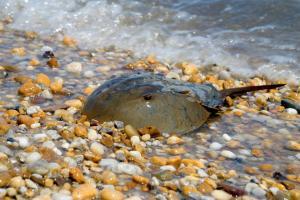The horseshoe crab is 450 million years old and has sky blue blood. One litre is $16k. Pharma companies cant release a COVID vaccine without it.

Horseshoe crab. Pic/Getty Images

Name a single creature that has blue blood. Not just blue, but pretty soft sky blue. Give up? It's an unprepossessing, unlovable creature called the horseshoe crab.
ADVERTISEMENT
What does this have to do with the price of onions? Why on earth should you waste your time reading about a stupid crab that you can't even cook and eat?
Because without the horseshoe crab and its lovely blue blood, it's very unlikely that you'd get a COVID-19 vaccine anytime soon. Or any other vaccine. Or a pacemaker. Or a blood transfusion. Or even an injection.
If you took a walk along the Odisha coast, particularly the Balaramgadi beach near Balasore, you'd probably see India's largest concentration of horseshoe crabs. They are scattered along the eastern coast from Bengal down to Andhra Pradesh. If you found them on the beach, they'd probably be having unfettered sex, though the word orgy might be more appropriate. Five to six males at a time might try to score with a single female, sometimes continuing long after she'd died. I know, right? Gross.
Yet, the honestly ugly horseshoe crab has a superpower that even dinosaurs did not have. Dinos got wiped out, remember? We are probably heading in that direction too, right? But the horseshoe crab has been around for 450 million years, which makes it pre-Cambrian. In that period, it hasn't changed at all. It's a boring, sex-obsessed, plug-ugly crustacean with blue blood. Fishermen call it a "trash fish" and use it as bait.
And its superpower? Happens to be in its blue blood. A single litre sells for $16,000, and the market for horseshoe crab blood is estimated to be well over $1 billion. With over 400 COVID-19 vaccines going into trial, it looks like everyone's going to be wanting the blue blood.
I thought we could reflect for a moment on the fact that one of earth's most insignificant and more recent species, namely us egregious human beings, suck the blood of one of God's most durable and hardy creatures just to save our own skins.
So what is it about horseshoe crab blood? It contains certain cells called amoebocytes that are exquisitely sensitive to anything that doesn't belong in the blood. When they detect a foreign bacteria, dead or alive, they release granules of coagulogen, a gooey substance which encases the outsiders, jellifying them until the Seal team can come and finish them off. Lysates, the specific chemical that does this, can detect impurities present in quantities as low as one part in a trillion.
When this was discovered, suddenly everyone wanted lysates, especially big pharma. Till then, everything had to be tested on rabbits. A vaccine for a human would first have to be injected into a rabbit to see if it developed a fever. But rabbits are nervous critters and known to develop a fever even when frightened. Lysates were incredibly more sophisticated.
Horseshoe crabs had fixed and well-known breeding grounds, one of the largest being Delaware Bay in the USA. Pharmaceutical representatives would arrive in trucks during the mating season and kidnap tens of thousands of horseshoe crabs peacefully having wanton sex orgies on the beach. Once in the laboratory, they would be cleaned, shone, tied, intubated and about a third of their blood drained before they were thrown back in the sea. About 15% of them would die during the process.
Humans suck out the blood of about half a million horseshoe crabs every year to extract the lysates. The test they create with it — known as LAL, or the Limulus Amoebocyte Lysate — is so ultra-sensitive, fail-safe and speedy that in 1977, the US Food and Drug Administration declared LAL as the one mandatory test for anything medical for use on or inside a human being. That includes pills, liquids, surgical instruments, vaccines, ligatures, syringes and others.
If it had not been cleared by the horseshoe crab, it could not go on the market.
Why am I frowning? Because the reason we are in the middle of this dreadful, destructive COVID-19 pandemic is that we're not as fussy about germs as the horseshoe crab. We have knowingly let the virus into our lives, our homes, our societies and our bodies, doing things we were told not to. We gathered in crowded public squares and breathed on each other. We pretended the virus is insignificant. We treated masks and hand washing as optional.
The irony is that we need the meticulous blood of a mindless primitive creature to certify a modern COVID-19 vaccine for an arrogant and self-centred species that treats hygiene as an elite's choice, and has used a deadly pandemic as an occasion for scoring political points rather than responding with compassion.
We don't deserve the horseshoe crab.
Here, viewed from there. C Y Gopinath, in Bangkok, throws unique light and shadows on Mumbai, the city that raised him. You can reach him at cygopi@gmail.com
Send your feedback to mailbag@mid-day.com
The views expressed in this column are the individual's and don't represent those of the paper
Keep scrolling to read more news
Catch up on all the latest Mumbai news, crime news, current affairs, and a complete guide from food to things to do and events across Mumbai. Also download the new mid-day Android and iOS apps to get latest updates.
Mid-Day is now on Telegram. Click here to join our channel (@middayinfomedialtd) and stay updated with the latest news
 Subscribe today by clicking the link and stay updated with the latest news!" Click here!
Subscribe today by clicking the link and stay updated with the latest news!" Click here!







